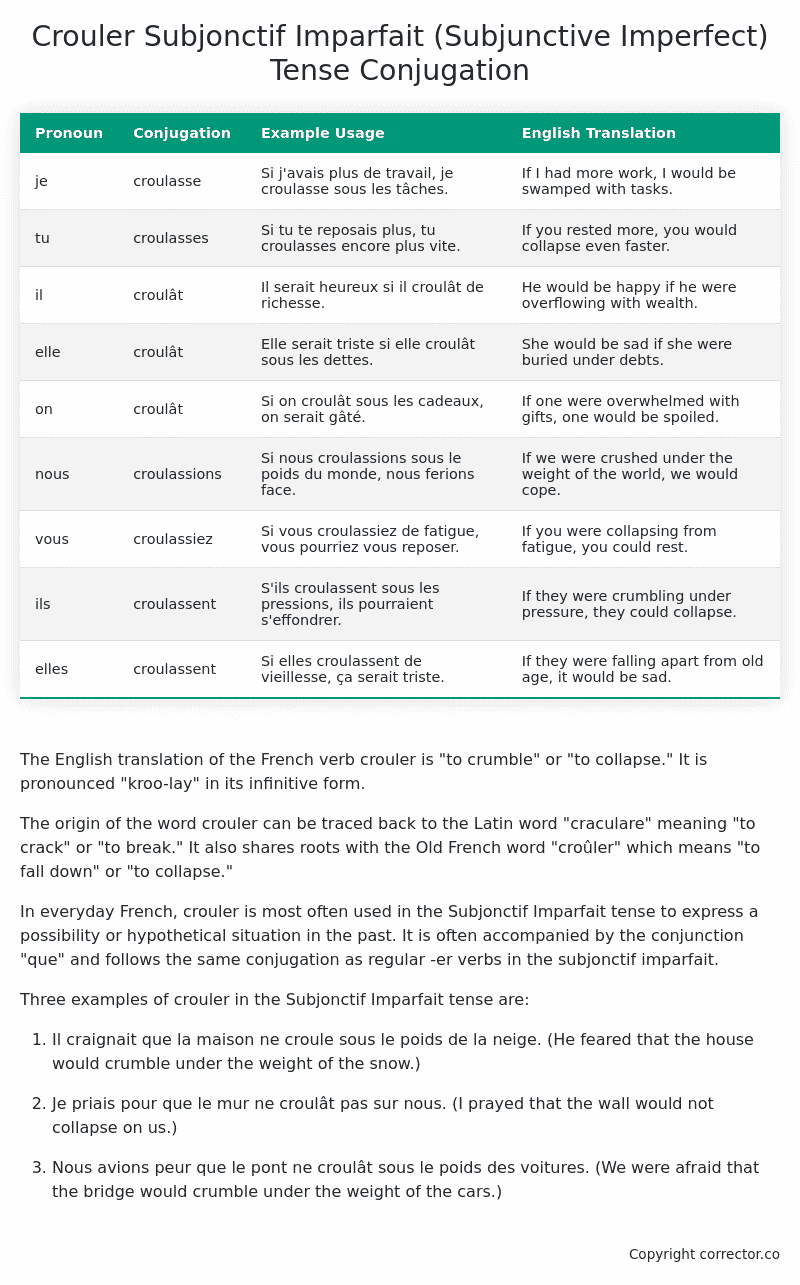Subjonctif Imparfait (Subjunctive Imperfect) Tense Conjugation of the French Verb crouler
Introduction to the verb crouler
The English translation of the French verb crouler is “to crumble” or “to collapse.” It is pronounced “kroo-lay” in its infinitive form.
The origin of the word crouler can be traced back to the Latin word “craculare” meaning “to crack” or “to break.” It also shares roots with the Old French word “croûler” which means “to fall down” or “to collapse.”
In everyday French, crouler is most often used in the Subjonctif Imparfait tense to express a possibility or hypothetical situation in the past. It is often accompanied by the conjunction “que” and follows the same conjugation as regular -er verbs in the subjonctif imparfait.
Three examples of crouler in the Subjonctif Imparfait tense are:
-
Il craignait que la maison ne croule sous le poids de la neige. (He feared that the house would crumble under the weight of the snow.)
-
Je priais pour que le mur ne croulât pas sur nous. (I prayed that the wall would not collapse on us.)
-
Nous avions peur que le pont ne croulât sous le poids des voitures. (We were afraid that the bridge would crumble under the weight of the cars.)
Table of the Subjonctif Imparfait (Subjunctive Imperfect) Tense Conjugation of crouler
| Pronoun | Conjugation | Example Usage | English Translation |
|---|---|---|---|
| je | croulasse | Si j’avais plus de travail, je croulasse sous les tâches. | If I had more work, I would be swamped with tasks. |
| tu | croulasses | Si tu te reposais plus, tu croulasses encore plus vite. | If you rested more, you would collapse even faster. |
| il | croulât | Il serait heureux si il croulât de richesse. | He would be happy if he were overflowing with wealth. |
| elle | croulât | Elle serait triste si elle croulât sous les dettes. | She would be sad if she were buried under debts. |
| on | croulât | Si on croulât sous les cadeaux, on serait gâté. | If one were overwhelmed with gifts, one would be spoiled. |
| nous | croulassions | Si nous croulassions sous le poids du monde, nous ferions face. | If we were crushed under the weight of the world, we would cope. |
| vous | croulassiez | Si vous croulassiez de fatigue, vous pourriez vous reposer. | If you were collapsing from fatigue, you could rest. |
| ils | croulassent | S’ils croulassent sous les pressions, ils pourraient s’effondrer. | If they were crumbling under pressure, they could collapse. |
| elles | croulassent | Si elles croulassent de vieillesse, ça serait triste. | If they were falling apart from old age, it would be sad. |
Other Conjugations for Crouler.
Le Present (Present Tense) Conjugation of the French Verb crouler
Imparfait (Imperfect) Tense Conjugation of the French Verb crouler
Passé Simple (Simple Past) Tense Conjugation of the French Verb crouler
Passé Composé (Present Perfect) Tense Conjugation of the French Verb crouler
Futur Simple (Simple Future) Tense Conjugation of the French Verb crouler
Futur Proche (Near Future) Tense Conjugation of the French Verb crouler
Plus-que-parfait (Pluperfect) Tense Conjugation of the French Verb crouler
Passé Antérieur (Past Anterior) Tense Conjugation of the French Verb crouler
Futur Antérieur (Future Anterior) Tense Conjugation of the French Verb crouler
Subjonctif Présent (Subjunctive Present) Tense Conjugation of the French Verb crouler
Subjonctif Passé (Subjunctive Past) Tense Conjugation of the French Verb crouler
Subjonctif Imparfait (Subjunctive Imperfect) Tense Conjugation of the French Verb crouler (this article)
Subjonctif Plus-que-parfait (Subjunctive Pluperfect) Tense Conjugation of the French Verb crouler
Conditionnel Présent (Conditional Present) Tense Conjugation of the French Verb crouler
Conditionnel Passé (Conditional Past) Tense Conjugation of the French Verb crouler
L’impératif Présent (Imperative Present) Tense Conjugation of the French Verb crouler
L’infinitif Présent (Infinitive Present) Tense Conjugation of the French Verb crouler
Struggling with French verbs or the language in general? Why not use our free French Grammar Checker – no registration required!
Get a FREE Download Study Sheet of this Conjugation 🔥
Simply right click the image below, click “save image” and get your free reference for the crouler Subjonctif Imparfait tense conjugation!

Crouler – About the French Subjonctif Imparfait (Subjunctive Imperfect) Tense
Formation
Common Everyday Usage Patterns
Interactions with Other Tenses
Subjonctif Présent
Indicatif Passé Composé
Conditional
Conditional Perfect
Summary
I hope you enjoyed this article on the verb crouler. Still in a learning mood? Check out another TOTALLY random French verb conjugation!


